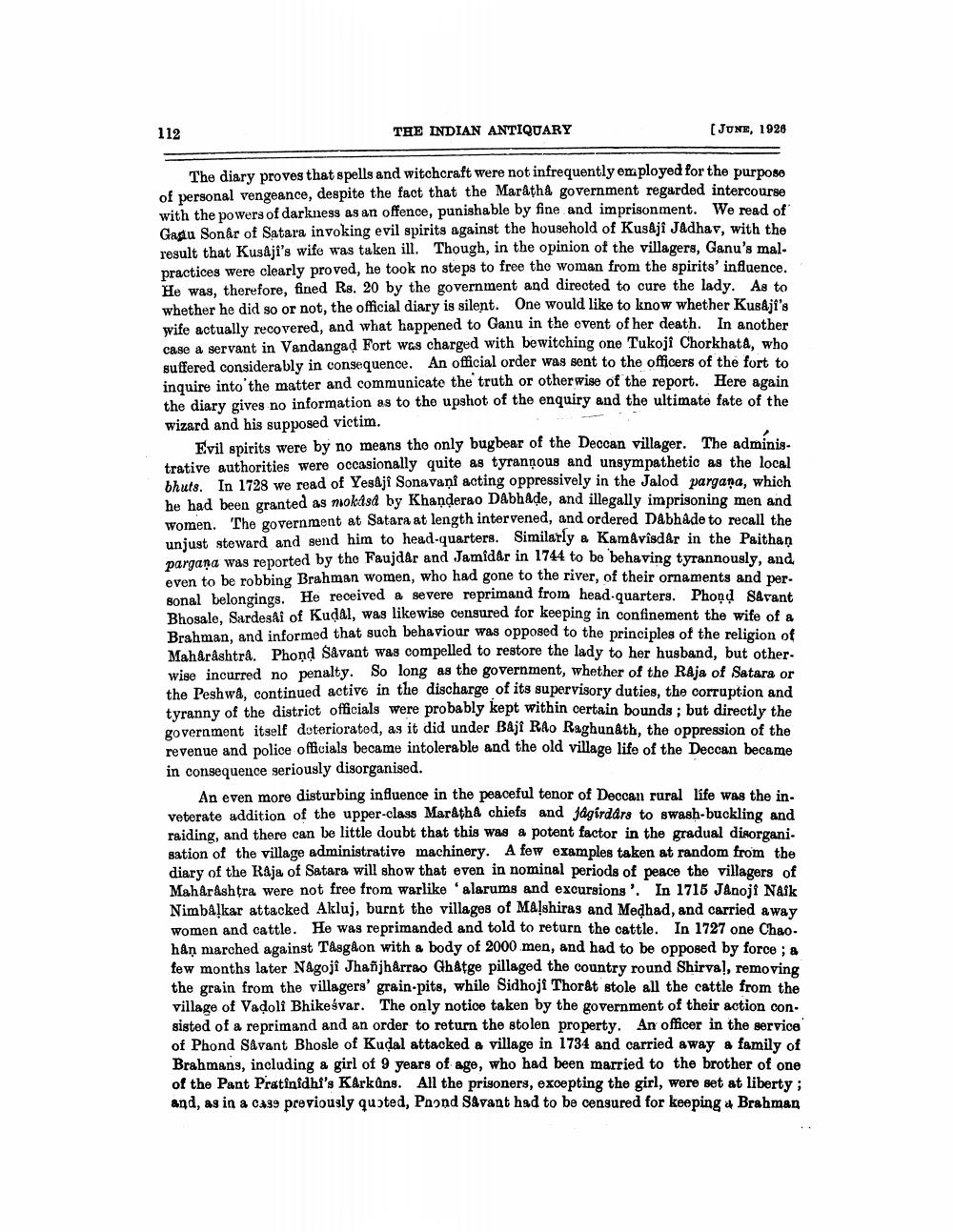________________
112
THE INDIAN ANTIQUARY
[JUNE, 1926
The diary proves that spells and witchcraft were not infrequently employed for the purpose of personal vengeance, despite the fact that the Maratha government regarded intercourse with the powers of darkness as an offence, punishable by fine and imprisonment. We read of Gadu Sonâr of Satara invoking evil spirits against the household of Kusaji Jadhav, with the result that Kusaji's wife was taken ill. Though, in the opinion of the villagers, Ganu's malpractices were clearly proved, he took no steps to free the woman from the spirits' influence. He was, therefore, fined Rs. 20 by the government and directed to cure the lady. As to whether he did so or not, the official diary is silent. One would like to know whether Kusaji's wife actually recovered, and what happened to Ganu in the event of her death. In another case a servant in Vandangaḍ Fort was charged with bewitching one Tukoji Chorkhata, who suffered considerably in consequence. An official order was sent to the officers of the fort to inquire into the matter and communicate the truth or otherwise of the report. Here again the diary gives no information as to the upshot of the enquiry and the ultimate fate of the wizard and his supposed victim.
Evil spirits were by no means the only bugbear of the Deccan villager. The adminis trative authorities were occasionally quite as tyrannous and unsympathetic as the local bhuts. In 1728 we read of Yesaji Sonavani acting oppressively in the Jalod pargana, which he had been granted as mokasd by Khanderao Dabhade, and illegally imprisoning men and women. The government at Satara at length intervened, and ordered Dabhade to recall the unjust steward and send him to head-quarters. Similarly a Kamavisdar in the Paithan pargana was reported by the Faujdar and Jamidar in 1744 to be behaving tyrannously, and even to be robbing Brahman women, who had gone to the river, of their ornaments and personal belongings. He received a severe reprimand from head-quarters. Phond Savant Bhosale, Sardesai of Kudal, was likewise censured for keeping in confinement the wife of a Brahman, and informed that such behaviour was opposed to the principles of the religion of Maharashtra. Phond Savant was compelled to restore the lady to her husband, but otherwise incurred no penalty. So long as the government, whether of the Raja of Satara or the Peshwa, continued active in the discharge of its supervisory duties, the corruption and tyranny of the district officials were probably kept within certain bounds; but directly the government itself deteriorated, as it did under Baji Rao Raghunath, the oppression of the revenue and police officials became intolerable and the old village life of the Deccan became in consequence seriously disorganised.
An even more disturbing influence in the peaceful tenor of Deccan rural life was the inveterate addition of the upper-class Maratha chiefs and jagirdars to swash-buckling and raiding, and there can be little doubt that this was a potent factor in the gradual disorganisation of the village administrative machinery. A few examples taken at random from the diary of the Raja of Satara will show that even in nominal periods of peace the villagers of Maharashtra were not free from warlike 'alarums and excursions'. In 1715 Janoji Naik Nimbalkar attacked Akluj, burnt the villages of Malshiras and Meḍhad, and carried away women and cattle. He was reprimanded and told to return the cattle. In 1727 one Chaohân marched against Tasgaon with a body of 2000 men, and had to be opposed by force; a few months later Nagojî Jhanjharrao Ghatge pillaged the country round Shirval, removing the grain from the villagers' grain-pits, while Sidhoji Thorât stole all the cattle from the village of Vadoli Bhikeśvar. The only notice taken by the government of their action con. sisted of a reprimand and an order to return the stolen property. An officer in the service of Phond Savant Bhosle of Kudal attacked a village in 1734 and carried away a family of Brahmans, including a girl of 9 years of age, who had been married to the brother of one of the Pant Pratinidhi's Karkuns. All the prisoners, excepting the girl, were set at liberty; and, as in a case previously quoted, Paond Savant had to be censured for keeping a Brahman
મ




